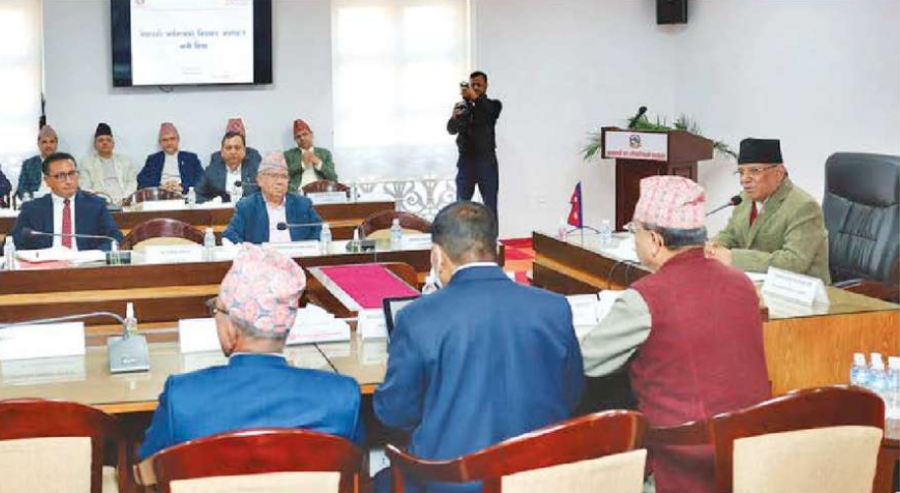Money
Prime Minister Dahal, Finance Minister Mahat ‘sitting on their hands’ as the economy falters
It was only on Tuesday the prime minister invited the private sector and experts to discuss the economy.
Sangam Prasain
Nepal has not only been grappling with steep inflation but also facing other problems—shops are suddenly finding fewer customers even during the festive season.
Empty shops have begun to appear on the streets of Kathmandu. And in other cities too, a large number of shops lie vacant as the recession exacerbates other problems, such as rising rents and reduced customer footfall.
The country is also experiencing problems like a real estate slowdown, a tumbling stock market and rising unemployment, all of which have rattled the economy even as a new government was formed a year ago.
Many sectors are not performing due to subdued demand, as economic activities have stalled.
Experts say that in a country where a million young people leave annually, it hampers consumption, a major driver of the economy.
For example, the exodus of nearly a million young people has reduced the demand for mobile data. Smartphone sales have declined, according to insiders. The demand for restaurants, the demand for alcohol, food and beverages has also dropped sharply. The demand for bikes and cars is subdued too.
There are worries about the Nepali currency, which is plummeting against the US dollar, making goods expensive for the import-driven economy like Nepal.
The government is struggling to raise revenue and pump money into the economy.
Nepal first witnessed a recession and then a protracted slowdown running for months.
It was only on Tuesday the prime minister invited the private sector and experts to discuss the economy.
“It’s a late response from the government,” said Jagadish C Pokharel, an economist.
“At least the dialogue has started, which is a positive sign.”
“The prime minister, finance minister and the central bank governor are sitting on their hands as the economy falters. They have no plan to get the economy growing and no plan to boost the private sector's confidence.
“This inaction is a recipe for disaster. There have been many discussions before but the suggestions are never seriously implemented,” he said.
He said that there are many policy reforms that the government has to initiate to put the economy onto the track.
“For this, the government should listen to the private sector and there should be proper coordination between the Prime Minister’s Office, the Finance Ministry and the Nepal Rastra Bank on the suggestions given by the private sector.”
Experts say that officials can do a lot more to trigger spending to meet growth targets and create jobs.
Remittances sent by Nepalis working abroad reached Rs136.97 billion in the mid-September to mid-October period, the highest-ever amount in one month in the country’s history.
With record high remittances, the gross foreign exchange reserves increased by 6.7 percent to Rs1.64 trillion in mid-October 2023 from Rs1.53 trillion in mid-July 2023.
But there is a catch.
Despite enough loanable funds in the banks due to the surplus liquidity, people are neither borrowing or investing in new ventures. Instead, people are buying gold—which is known as a safe haven for investment.
Manik Ratna Shakya, president of the Federation of Nepal Gold and Silver Dealers' Association, said sales of gold accounted for more than Rs1.25 billion in just three days of the Tihar festival.
Shakya said that around 50 kg of gold was sold on the day of Dhanteras, which fell on November 10 this year.
“The gold sales during the week-long Tihar festival shows people seek out safe havens to limit their exposure to losses,” said Pokharel. “The sales of gold shows that people are not confident in the market and investment.”
“Nepal's economy is in a sensitive mode,” Chandra Prasad Dhakal, president of the Federation of Nepalese Chambers of Commerce and Industry (FNCCI), the apex private sector body, told the prime minister during the meeting.
“The banks and financial institutions have around Rs500 billion in loanable funds. Remittance inflow is on a record-high spree. Foreign exchange reserves too are at an all-time high. About 120,000 tourists entered the country in October. In the current financial year, the demand situation is continuously positive. But this is one side of the coin,” he said.
On the other hand, the government account is in deficit. The budget allocated for current expenditure is constantly increasing.
The income of banks and financial institutions has been decreasing which may affect the government’s revenue further, said Dhakal. “The development spending is shockingly low. This shows that the government is under pressure.”
Economists say that as there is no policy stability, the economy is struggling.
Experts say that the trend of the current government reversing policies overnight has raised eyebrows among investors.
For example, Nepal Oil Corporation tossed out its auto pricing mechanism and rolled back fuel prices following an executive order by Prime Minister Pushpa Kamal Dahal.
In real estate too, the government’s policy is not stable as it keeps amending its land use regulations for land zoning.
In March, the government raised the subsidised prices of diammonium phosphate (DAP), an essential farm input, to boost supply.
A week after the prices of chemical fertilisers were increased to rein in the subsidies following the stress on the treasury, the decision was rolled back at the behest of the prime minister.
“Verbal orders are replacing the law,” said Pokharel.
Nepal's attempt to save foreign exchange by strangling imports nearly suffocated the economy in the last fiscal year, trade experts said.
Worried by rapidly receding foreign currency reserves and growing trade imbalance, the government in April 2022 banned the import of a slew of items it called luxury goods.
The embargo, which lasted till December 2022, worked only too well. It had the desired effect of squeezing the bloated trade deficit, but it also caused the economy to slow down dangerously to a near stall.
Trade experts said the ad hoc decision to slam the brakes on imports put the country into total disarray in the last fiscal year. The annual growth rate sank to a new low, and Nepal plunged into its first recession in six decades in the first two quarters.
There are geopolitical factors too and each successive government has been playing the India and China card to win their trust.
The construction licence for developing the Budhi Gandaki Hydropower Project was awarded to a Chinese company, but the next government snatched the licence away.
The much-touted West Seti Hydropower Project and Seti River Project in western Nepal were awarded to India through a negotiation window after China withdrew from them.
The newly built airports in Pokhara and Bhairahawa have landed in geopolitical controversy and the government is still clueless about how to operate them.
“When big projects don’t deliver and become white elephants, they push the economy into deep trouble. The debt rises as a result,” according to experts.
FNCCI President Dhakal said that industries, such as cement, are running at less than 30 percent capacity.
“The shutters of small and medium businesses have been closed. Agricultural products are losing more markets. Demand is shrinking. There is extreme frustration among businessmen and they are planning to escape instead of investing,” said Dhakal.
“There were a lot of discussions on the economy but no solution yet,” said Dhakal.




 10.12°C Kathmandu
10.12°C Kathmandu














